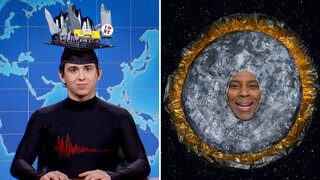How to Safely Watch and Stream the 2024 Solar Eclipse Right Now
Lester Holt will host a two-hour special, "Total Eclipse 2024," at 2 p.m. ET on NBC and NBC News NOW.
Grab your eclipse glasses because history is being made on Monday, April 8. Everything to know about what exactly the phenomenon is, when and where it's happening, how to watch it, and more below.
What is the 2024 total solar eclipse?
A solar eclipse is happening over Mexico, 15 states in the U.S., and a small part of eastern Canada. According to NASA, "a total solar eclipse happens when the moon passes between the sun and earth, completely blocking the face of the Sun. The sky will darken as if it were dawn or dusk."
NBC News reported, "The timing of the eclipse and the duration of totality varies by location. Most places will experience around 2 minutes of darkness, but the longest periods of totality are typically in the center of the eclipse’s path. This year, the longest stretch of totality will last 4 minutes and 28 seconds in an area northwest of Torreón, Mexico."
A solar eclipse can only happen during the new moon phase, as Neil DeGrasse Tyson, director of the Hayden Planetarium at the American Museum of Natural History, explained to NBC News: “Imagine if the moon’s orbit were in the plane of Earth’s orbit around the sun — if that were the case, then every new moon, you’d have a total solar eclipse and every full moon, you’d have a lunar eclipse. So, because things don’t always align, it lends to the rarity of the event and the specialness of the event.”
What time does the solar eclipse start?
NASA has provided a list of times for when the eclipse will happen across the U.S. For Dallas, the partial eclipse will start at 12:23 p.m. CT, with totality at 1:40 p.m. The partial eclipse will end in Caribou, Maine at 4:40 pm ET. The eclipse will exit continental North America on the Atlantic coast of Newfoundland, Canada, at 5:16 p.m. NDT (Newfoundland Time).
How can I safely watch the eclipse on April 8, 2024?
The April 8 solar eclipse will be broadcast live on both network TV and cable channels. Lester Holt will host a two-hour special, Total Eclipse 2024, at 2 p.m. ET on NBC and NBC News NOW, from the Indianapolis Motor Speedway, the world’s largest viewing site of the 2024 eclipse.
TODAY’s Savannah Guthrie, Hoda Kotb, Craig Melvin, Carson Daly, Sheinelle Jones, Dylan Dreyer and Jenna Bush Hager will also cover the eclipse live from New York City's Museum of Natural History, while Al Roker will report live from Dallas.
To safely experience the eclipse at home, you should never stare directly into the sun, even when the moon is partly covering it. There are special eclipse sunglasses, which are thousands of times darker than regular sunglasses, which you can wear to safely view. If you weren't able to snag some special sunglasses, you can always make a pinhole projector in a pinch. Never look at the sun through telescopes, binoculars or camera lenses, unless they are equipped with special solar filters.
An eclipse is a spiritual and historical experience — even moreso in 2024 since the next total solar eclipse to cross the continental U.S. coast-to-coast will not occur until 2045.
You can also keep up-to-date with NBC News' live blog throughout the event.
What states will experience the total solar eclipse?
The 15 states that will experience the eclipse are: Texas, Oklahoma, Arkansas, Missouri, Illinois, Kentucky, Indiana, Ohio, Pennsylvania, New York, Vermont, New Hampshire and Maine. Small parts of Tennessee and Michigan will also be in the path.
Since the eclipse is occurring over the middle of the United States, NASA estimates that 31.6 million people "live within what’s known as the path of totality, where the total solar eclipse will be visible. An additional 150 million people live within 200 miles of the path, according to the agency." It depends on location, but some viewers totality could last up to 4 minutes and 28 seconds.




































